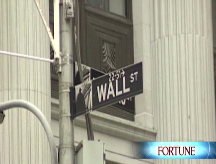Bailout talks in disarray
High stakes talks over $700 billion rescue end in chaos, one day after President Bush warns 'entire economy at risk.'
NEW YORK (CNNMoney.com) -- One day after President Bush said the nation's economy is at grave risk, the high-stakes negotiations over the proposed $700 billion bailout of the financial system ended in chaos on Thursday.
Lawmakers bickered over competing counterproposals and hours of meetings between key lawmakers broke down without any progress late into the evening.
A meeting at the White House between President Bush, congressional leaders and the presidential candidates was meant to speed approval of an agreement. Instead, the session revealed deep divisions between Democrats and House Republicans.
As a result, House and Senate leaders and Treasury Secretary Henry Paulson rushed to Capitol Hill at 8 p.m. to try to hash out a deal.
But shortly after 10 p.m., Rep. Barney Frank, D-Mass., the lead House Democrat on the issue who had been in close talks with Paulson for days, accused Republicans of refusing to negotiate.
"At this point, we have absolutely no participation or cooperation from House Republicans," Frank said.
The next step was not clear late Thursday night. One thing seems certain: Lawmakers won't recess for the year on Friday, as originally planned. Instead, if they can't reach a deal in the next 24 hours, they're likely to work through the weekend.
Leading Democrats said they were presented for the first time with the House Republican principles at the White House meeting.
Senate Banking Committee Chairman Christopher Dodd, D-Conn., said the White House meeting was thrown off course when participants were blindsided by a new "core agreement" that emerged in the meeting that not many had seen before.
Earlier in the day, congressional negotiators said they had agreed to a set of principles on revisions to the rescue plan, which calls for the Treasury Department to buy up bad mortgage securities from banks in an effort to get them to lend again.
The proposal, as amended by leaders in both chambers, will help homeowners, curb executive pay packages at participating firms and provide oversight of Treasury's actions, Dodd said in a lunchtime address.
"We've reached a fundamental agreement on a set of principles, one, for taxpayers, which is tremendously important," he said. "We're very confident we can act expeditiously."
The principles the Democrats said had been agreed upon call for Congress to make $250 billion available immediately with $100 billion available, if needed, without requiring additional congressional approval, said two senior Democratic aides familiar with the negotiations. The second half of $350 billion would then become available by a special approval of Congress.
On executive compensation, the draft would require limits on compensation for executives of any company participating in the bailout. These caps would apply for as long as the company is in the program. This would include some language to limit excess "golden parachutes."
Treasury will also get an equity stake in the companies being helped by the bailout, though what type remains to be worked out.
Still to be worked out is whether to allow bankruptcy judges to modify mortgage terms, a provision backed by many Democrats and community activists but opposed by Republicans and the banking industry.
The bankruptcy provision is not the only sticking point, however. House Republicans are not on board, according to Minority Leader Rep. John Boehner, R-Ohio.
"House Republicans have not agreed to any plan at this point," Boehner said.
Instead, they issued a statement of economic rescue principles that calls for Wall Street to fund the recovery by injecting private capital - not taxpayer dollars - into the financial markets. Easing tax laws would prompt investors to put in their own dollars, they said.
The plan also calls for: participating firms to disclose the value of the mortgage assets on their books, ending Fannie Mae and Freddie Mac's securitization of "unsound mortgages," reviewing the performance of the credit rating agencies and having the Securities and Exchange Commission audit failed companies to ensure their financial standing was accurately portrayed.
House Republicans also want to create a panel to make recommendations for reforming the financial industry by year's end.
Meanwhile, the ranking Republican on the Senate Banking Committee has another idea. Sen. Richard Shelby, R-Ala., said he doesn't support the Treasury plan until there is serious consideration of alternatives. He proposed Thursday adding funds to the Federal Reserve and Treasury to allow them to lend more to financial institutions.
Before the afternoon meeting, Bush said he expects a deal "very shortly."
After, a counselor to the president said "we're getting closer. There's some more that has to be done. It's going to be a consensus plan at the end of the day."
"Both sides are going to have to work hard to get to an agreement," presidential counselor Ed Gillespie said on CNN.
Administration officials have spent countless hours this week behind closed doors with and in public hearings before Congress. Lawmakers were hoping to have a deal agreeable to both parties hammered out before Thursday's meeting at the White House.
On Wednesday night, Bush took the nation's airwaves in a prime-time address in which he laid out a looming economic disaster.
"The government's top economic experts warn that, without immediate action by Congress, America could slip into a financial panic and a distressing scenario would unfold," Bush said. "More banks could fail, including some in your community. The stock market would drop even more, which would reduce the value of your retirement account. The value of your home could plummet. Foreclosures would rise dramatically."
CNN Correspondent Kate Bolduan and Congressional Producers Deirdre Walsh and Lesa Jansen contributed to this report. ![]()





